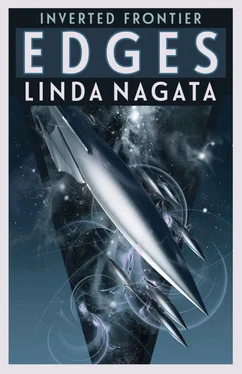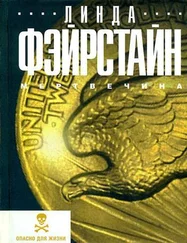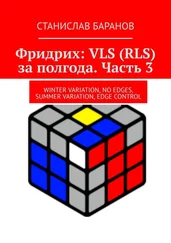“Is that what you’re expecting?” Kona asked him.
“It’s what I want. We’re not ready for a confrontation.”
“Sooth.” That was unarguable truth.
Urban had demonstrated an unsuspected reservoir of patience in dealing with the entity. He’d consistently rejected any suggestion of trying again to forcefully expel the capsule, or even of preparing a kinetic response that could be held in reserve. He did not want to incite the entity, push the conflict to a premature conclusion—not when he believed he could get his ship back, whole and intact, by beating the invader’s molecular defenses.
“What is the temperature of the capsule?” Riffan asked. “Has it changed?”
The Bio-mechanic put on a show of narrowing his eyes, cocking his head, as if seeking the data—an affectation that annoyed Kona. DIs were so much less complicated.
“Infrared measurements show a slight increase in temperature,” the Bio-mechanic informed them. “Less than a tenth of a degree.”
“It’s a good gauge of activity,” the Engineer said in his ever-reasonable voice. “If processes are continuing within the capsule, we can expect the temperature to rise further. If those processes have ceased, it will gradually cool to ambient.”
“It won’t cool,” Pasha said. “That would indicate it was entering a hibernation state—and that would leave it vulnerable.”
“I agree,” Vytet said. “My suspicion is that the entity is reordering the capsule’s interior anatomy, possibly consolidating computational strata. As soon as that’s done, we’ll see a return to normal circulation—or possibly a new normal.”
Shoran spread her hands in frustration. “And then? Another twenty years of argument among ourselves about what it all means?” She snorted. “Give us another twenty years to devote to baseless speculation, and we’ll be at war with each other.”
Kona gave her a slight nod, a silent thank you, grateful for her blunt manner. “It’s a frustrating situation,” he said. “And when facts are short, it’s human nature to put our own interpretation on things.” He fixed Naresh with his gaze. “Still, we need to remain wary of the entity, and not of each other.”
Naresh’s shoulders slumped. He turned half away. “I just… I worry some among us might take precipitous action, seeing malice where there is none.”
Kona’s fleeting hope of a truce vanished as Clemantine drew back, crossed her arms in a confrontational posture. “If only there was some action we could take,” she said. “The so-called Naresh Sequence was supposed to give us a fighting chance, but we’re not there yet. If you know another means to contain the entity, please do share.”
Naresh turned back. His chin rose. “I only worry what others might have in mind, given the bias of opinions. What will we gain if we destroy it?”
Clemantine snorted. “Just our autonomy. Our sovereignty.”
“Only to be lost again at our next encounter. Don’t you see? The entity must have originated in the Hallowed Vasties. Nothing else makes sense. And given that its abilities are so far beyond ours, that tells us we are not prepared to meet other beings that may exist there. We need the entity. We need it on our side. We need its skills and knowledge to have any hope of holding on to our autonomy, our sovereignty, of simply surviving our encounters with the old worlds. We need to make it our ally—and that is a realistic possibility. Remember its words. We can help each other .”
“You are hanging a great deal of hope on one small phrase,” Clemantine said.
This drew murmurs of agreement from both Shoran and Pasha. And while Kona sympathized with Naresh’s hopes, he felt them premature. “Naresh, you want it to turn out well,” he said. “So do I. So do we all. But so far we have evidence of restraint, not of good will. Let the entity prove its good will to us.”
“But not yet,” Urban insisted. “We’re not ready to meet it yet.”
Forty-seven minutes later, the slow flow of matter into and out of the capsule resumed. No other changes were detected—not in the capsule, along the tendrils, or anywhere within the ship’s tissues.
By this time, Kona’s physical incarnation had emerged from cold sleep, and in that form, he met Shoran at the dining terrace. Naresh and Vytet soon joined them, Vytet with amber eyes and onyx skin, her hair an ashen gray. They all remarked on how empty the gee deck felt, abandoned to songbirds, all the rest of the ship’s company still in cold sleep.
Naresh tried to continue his argument, but Shoran wasn’t in the mood. “It’s the entity who will decide the direction this encounter takes,” she told him, and turned the conversation to other things.
She and Kona were never far apart over the ensuing days as they waited to see if the brief anomaly would lead to something more. After a time, the quiet of the gee deck led Kona to uneasy dreams of an empty city, overgrown by lush foliage, the white bones of former inhabitants glinting in the humus. One night, he cried out in his sleep, and woke Shoran.
“That’s a memory of Silk, when you first came to it,” she said.
“ Sooth . A long, long time ago.”
They lay together in the bedroom of his cottage, melancholy in the early morning.
“I miss Deception Well,” she confessed. “To be able to take off at a whim and wander through the wilds. I need that. I need for us to arrive somewhere, to get out of this ship and into wider territory.”
“Tanjiri is only a few decades away.”
“Or,” she murmured, turning toward him, her lips beginning to wander across his bare shoulder, “if things go right, just a handful of days, perceptually.”
“Are you ready for the next great leap forward?”
She drew back, her gaze serious. “Not too great a leap, I hope. Every time I wake from cold sleep, my first thought is, Have we lost? I expect to find myself aboard Griffin in some faraway future where we’ve missed all our destinations, and only Clemantine and the Unknown God aware of our history, and what exists outside the ship.” She dropped down into the curve of his arm with a sigh. “Each time I wake, it’s a relief to know Dragon is not lost to us… yet.”
<><><>
Pasha emerged from cold sleep. Checked the date and time, confirming it was a scheduled waking. Another year had passed.
She used her toes to clutch a ribbon of glowing wall-weed as she floated in the zero-gravity of the warren, wiping away the remnant gel of her cocoon. The chamber where she’d wakened was crowded with the bodies of her shipmates, wrapped up in cocoons of their own and tethered by wall-weed.
She dressed herself in newly budded clothing while listening to a DI’s summary report:
*The containment capsule remains quiescent…
“As it has been for decades,” she murmured. This was not news. If there had been any sign of activity, this DI would have wakened her early.
*… with no indication of an imminent threat from the entity…
She rolled her eyes. As if there would be some warning before it finally burst forth.
The DI went on to summarize the Bio-mechanic’s ongoing work on the Naresh Sequence. This news was not good.
In the decades since Naresh had posted his family history to the library, the data uncovered in that one fortuitous document had led to radical improvement in the adaptability and response speed of the fleet’s arsenal of defensive Makers—but still not enough to convince the Bio-mechanic he could overwhelm the entity and safely eliminate its presence from the ship.
Now the Bio-mechanic reported that useful new forms no longer appeared in the evolving digital simulations inspired by the Naresh Sequence. That line of research had reached its end.
Читать дальше












